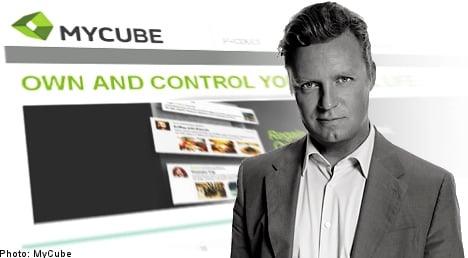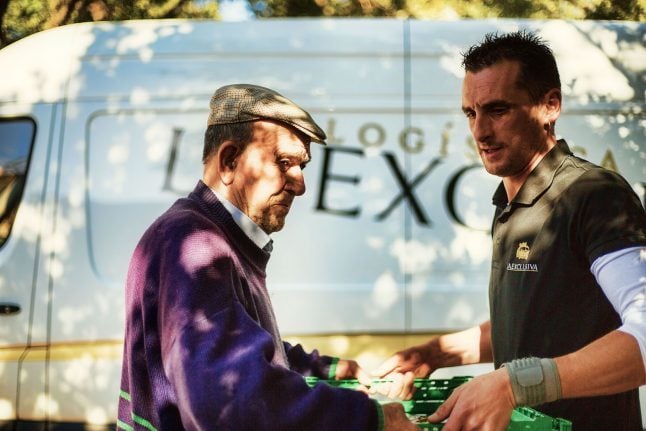It is hectic these days in Sweden, with elections coming up, WikiLeaks and others in the news, so I was happy being able to catch up with Johan Staël von Holstein at Arlanda airport in Stockholm. As always, he's in a hurry, this time to catch a plane to take him to Singapore, where he now calls home.
“I live in wonderful Singapore, but I am here now and then,” says Staël von Holstein. “My partner Johan Sellström is leading some of the development for MyCube here. We have chosen Singapore and Sweden because of their talent pools, digital infrastructures and geographical positions, covering the Asian and European markets.”
It is clear that they have had good judgment, as the World Economic Forum has just named these countries as two of the top three competitive nations in the world in its Global Competitiveness Report 2010/11 , ahead of the US.
He's already looking at his watch, so I jump right to it. Will Sweden yet again be behind the launch of one of the world's largest internet companies? Staël von Holstein's eyes sparkle and with a broad smile he replies.
“Yes, of course. Sweden has a rich heritage of success in this sector,” he says. “No other country outside of the US has generated more companies with true international success on the internet. Swedish entrepreneurs brought the world Skype, MySQL, Tradedoubler, Pricerunner, Spotify, Kazaa, ThePirateBay and LBI.”
He adds, “We have the pedigree, ingenuity and the talent to be leading the evolution of the internet. But I must say MyCube is a truly international company with 12 nationalities among its 30 employees.”
Swedish entrepreneurs could again be leading this next push in to the future of the internet if MyCube, launched on Wednesday, fulfills its ambition to redefine social networking. Straight away, it's easy to see that Staël von Holstein has massive ambition, but he also has credentials to match.
The MyCube founder and CEO is one of the internet's true pioneers. He founded Letsbuyit.com in 1998, for a while the largest e-commerce company in Europe and the first consumer aggregator and role model for Groupon. He was also among the first investors in aSmallworld and prior to that, one of the founding partners in Icon Medialab, (LBI) the world's largest internet consultancy.
After two and a half years in development, MyCube is ready to introduce the world to what Staël von Holstein claims will be social networking 2.0. How does it feel to finally launch and why has it taken so long?
“We had a rocket start in the winter and spring of 2008 and were up to 30 employees by August. Then we were hit by a sledgehammer with the financial crisis. It was probably just as well as nobody in the world wanted to listen to our arguments about privacy and integrity back then. But now they do,” he says with a confident smile.
The recent privacy backlash against Facebook has spawned a number of social network startups that claim to tackle the issue of privacy and integrity, the US company Diaspora probably being the best known example.
Is MyCube all about privacy too?
“It's funny that you mention Diaspora because they are launching on the same date as we are,” Staël von Holstein says. “No, MyCube is not just about privacy and integrity, it is putting privacy, ownership and control at the very heart of our service – as something that is sacrosanct and intrinsic to our offering.”
He adds, “The default of a MyCube profile is complete privacy. It's then for the user to decide what they do or don’t want to do. It's only in this way that users are really free to make decisions about their privacy, so in this respect MyCube is introducing real freedom into the social networking space.”
Surely as an entrepreneur Stael von Holstein must know that first mover advantage can play a critical role. Why has he been so quiet with his plans and isn't he afraid that companies like Diaspora might already have taken the field?
“No, no, no. Diaspora is a great initiative, but they have a different strategy,” he explains. “They look upon privacy and integrity as the goal. We are a sophisticated social exchange where privacy, and integrity is the beginning. The ownership and control provided with MyCube will enable you to create a true digital identity, and that will give you endless opportunities that will empower you and have remarkable effects on our society.”
He continues, “We will treat you as an individual with individual rights. You decide for yourself and only have to abide by the laws of the country where you live – not by the restrictions that the current networking companies places on you.
“It's about total ownership and control, turning the internet on its head by focusing on individualizing the whole system, putting social networking into a new era where the user will be totally platform independent and free.
“We are a social exchange where knowledge, interest, experience and valuable content can be monetized. Individualizing the internet will mean increased relevance, preciseness, timely and trust worthy information. We are so disruptive, we have deliberately chosen to go under the radar.”
What do you mean by a true digital identity?
“My real digital identity has to be a mirror image of my physical identity, which is actually who I really am; my bad sides, good sides, my secrets, my opinions and thoughts, it's diverse, it's complex, it's private and it's mine,” he says.
What will the benefits of that be?
“Because I can be myself. I have lectured to tens of thousands of people throughout the world and at these lectures, I have asked people, what are the greatest things in life? I have a list of some hundreds of words ranging from love to Mom to strawberries, but not one single word that reflects anything digital,” Staël von Holstein says.
“The more you live according to your physical life the better. The digital world should empower us, but today it is used to exploit us and we are run by internet companies and large brands. We have to interact on their terms, not our own terms like we do in real life. MyCube is setting you free and working for you,” he adds.
This sounds big and ambitious, so is his plan to take on Facebook as a direct competitor?
“No, I don't see us as a competitor in the traditional sense,” he says. “MyCube is a paradigm shift in how we relate to the internet. Just like the pop protocol set e-mails free from being restricted within AOL, Memo and Lotus Notes, MyCube will eventually set people free from being locked up in 'closed walled garden networks.'”
He adds, “We have created a social exchange where you can communicate with all your social networking sites. Where you can protect and monetize all of your digital assets and much more. Social media is vast and growing tremendously and there will be room for many, many new players. We are fragmenting the internet!”
Before I have a chance to ask, Staël von Holstein preempts my next question. There is literally no stopping him.
“Yes, I know you will ask that I'm claiming MyCube will change the world and become an internet giant, so surely I am competing with Facebook,” he says. “But I will tell you that this is completely different. It is fundamentally about having privacy, control and ownership of your digital life. Why wouldn't you want that?”
“We believe that everybody with individual brand value; intellectual property; knowledge of importance; everybody with assets of some kind – as well as people who are responsible and worried about their children and their future – should use MyCube,” he continues. “Why should anyone give away their digital assets to large internet companies to freely exploit for their own benefit?”
He adds, “You know, Mark Zuckerberg thinks that the era of privacy is over and Eric Schmidt at Google wants kids to change their names when they finish University. In fact, both Schmidt and Zuckerberg have publicly stated that anyone who's not comfortable with revealing everything about themselves must have something to hide.
“Between them, they've constructed an internet world-view that says everyone must live their lives in full view; where everything can – and should – be there for everyone to see.
“This isn't freedom, it's like living in the Soviet Union. They might be right and I might be wrong, but even if I am, at least 25 per cent of people will be as 'paranoid' as I am and they will, as I do, resist surrendering their privacy and seek freedom and choice. People simply want to have different relationships with different people. We all have things that we do not want totally in public.”
Staël von Holstein doesn't need any encouragement, but when I first mention Facebook, his demeanour changes. The smile is replaced by a steely look, the contemplative responses ditched for a torrent of pointed words.
Is he just out to attack Facebook's success and become the long-awaited alternative that probably hundreds of millions users today on Facebook have been waiting for?
“The thing about Facebook is that I love it and hate it,” he explains. “I love what I can do, but cannot for the life of me understand why they decide everything for me and limit my freedom and ability to control to such an extent.”
He adds, “I like to use the analogy of owning rather than renting property. Facebook can often feel like you're renting the space from a slum landlord. They dictate all the terms. If they want to put in a new window, they do. If they want to change the locks, they do. And if they want to kick you out of the whole property altogether, taking ownership of everything inside, they do.”
He continues, “A lot of people don't realize, but the content they put on existing social networks no longer belongs to them – all those pictures, contact details and discussions belong to the social network. If they ban you from their service, all those pictures, contacts, email exchanges are lost forever.
“With MyCube, we have created an experience that is about owning. You own the space and you do what you like in it. The content can't be taken away, only you can decide what should be deleted. MyCube won't tell you what you can and can't do.
“Unlike other social networks, MyCube won't force you to share anything. If you want to share with the world, fine. But if you don't, that's fine too. MyCube is not going to spy on you like Apple, Google and Facebook do.
“Instead, we'll provide the space for you to use as you like and you have to take personal responsibility for your own actions. But privacy, ownership and control is just one dimension of what MyCube will offer. I haven’t even got into the financial benefits we will empower people with.
“With MyCube, we have created a unique micro-payment system based on the exchange of valuable content between individuals and also an exchange between you and brands or businesses you are interested in having a dialogue with. You will see when we have our public launch, but I can promise it won't be anything like what you have ever seen on the Internet before.”
With another glance at his watch, I realise my time with Staël von Holstein is almost over. He's up and ready to go to his gate, but there's one last question burning in my mind. The idea is so broad, the company so small and the competition so large, how on earth is he going to make it happen?
“The demand from hundreds of million social media users is already there. All we are doing is providing the tools,” he says.
From our brief discussion, it's hard not to be won over by Staël von Holstein’s persuasive drive and passion. The potential of MyCube is tantalizing, opening up a new dimension not only to the debates about privacy and social networking, but to how we relate to the internet in a fundamental way.
As more of us create content that we want control over and value as part of our personal knowledge and expression, the idea that disruptive technology from an emerging company will create real value for that is perhaps the most exciting prospect.
MyCube launched its private beta on Wednesday and the rest of us will have to wait to see what the future of the internet could look like. I for one can't wait.




 Please whitelist us to continue reading.
Please whitelist us to continue reading.
Member comments